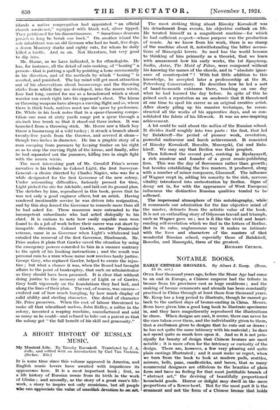A SHORT HISTORY OF RUSSIAN MUSIC.
My Musical Life. -By-Rimsky Korsakoff. Translated by J. A. Joffe, and edited with an introduction by Carl Van Vechten. (Seeker. 25s.)
IT is some time since this volume appeared in America, and English music lovers have awaited with impatience its appearance here. It is a most important book ; first, as a life history of Russian music from its birth in the work of Glinka ; and secondly, as the story of a great man's life- work, a -story to inspire not only musicians, but all people who can appreciate the value of unselfish devotion-to-au art.
The most striking thing about Rimsky Korsakoff was his detachment from events, his objective outlook on life. He treated himself as a magnificent machine—for which he had sufficient respect—whose purpose was the production of music. As we know from -his • work, there is no -stamp of the machine about it, notwithstanding the bitter accusa- tions of Musorgski lovers. So used has the world become to 'thinking of him primarily as a theorist, that we learn with amazement how his early works, the 1st Symphony, Sadko, Antar, The Maid of Pskov, were composed without his knowing the names of the chords, and in "absolute ignor- ance of counterpoint "'I With but little addition to this knowledge, he accepted later a professorship at the St. Petersburg Conservatory. He describes how he led a sort of hand-to-mouth existence there, teaching on one day what he had learned the day before. In spite of this he gained such a reputation as an academic that it threatened at one time to spoil his career as an original creative artist. After slowly piling up his massive technique, he recon- structed all the works of his apprentice days, and so con- solidated the fabric of his lifework. It was an awe-inspiring athievement.
A lot could be said about the milieu of the Russian school. It divides itself roughly into two parts : the first, that led by Balakireff—the period of pioneer work, revolution, powerful endeavour and harsh achievement. It consisted of Rimsky Korsakoff, Borodin, Musorgski, Cui and Bala- kireff. We may say that Berlioz was their prophet.
Then followed the second part, centring in Byelayayeff, a rich amateur and founder of a great music-publishing firm. This was the day of florescence rather than growth ; but besides establishing the 'five masters, it produced, along with a number of minor composers, Glazunoff. The influence, of Wagner crept in, adding his sonority 'to the rich, nervous vitality introduced into orchestration by Berlioz. Signs of decay set in, for with the appearance of West European influences the distinctive Russian qualities tended to be softened.
The impersonal atmosphere of this -autobiography, -while: it commands our admiration for the fine objective mind of the master, detracts from the artistic value of the book. It is not an enthralling story of Odyssean travail and triumph, such-as Wagner gave us ; nor is it like the vivid and heart- rending self-revelation which we find in the letters of 'Berlioz. But in its calm, unglamorous way it makes us intimate with the lives and characters of the masters of that wonderful Russian school, especially those of Balakireff, Borodin, and Musorgski, three of the greatest.
RICHARD CHURCH;."










































 Previous page
Previous page